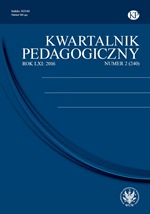Pedagogika padewska – dokumenty pamięci i samowiedzy
Padua pedagogy – documents of memory and self-knowledge
Author(s): Irena WojnarSubject(s): Social Sciences, Education
Published by: Wydawnictwa Uniwersytetu Warszawskiego
Keywords: Education; personalism; University of Padua; Rassegna di Pedagogia
Summary/Abstract: The article presents the academic profile of the so-called School of Padua (Scuola Padovana) against the background of general information about the Italian pedagogical thought and its diverse achievements in various universities. The basis of the presentation is the contribution to the pedagogical sciences made by the authors of a monographic issue of the “Rassegna di Pedagogia” journal, which is the oldest pedagogical journal in the world, founded in 1941 by Professor Giuseppe Flores d'Arcais, the creator and animator of personalist pedagogy in Padua (pedagogia della persona). In the light of works published in the “Rassegna...”, the proposal inspired by the Italian Renaissance tradition and European humanism is both a continuation of research studies conducted in this environment and a result of inspiration drawn from outside the Italian intellectual circles. The authors refer to the French personalist thought, to the German hermeneutics and philosophy of Bildung and to the Polish neo-Marxist humanism open to the sociohistorical horizons of thinking about the man and his alternative potentiality. This last area of mutually inspiring collaboration is connected with Professor Bogdan Suchodolski’s long academic presence in Padua. Professor Suchodolski was awarded an honorary doctorate at the University of Padua in 1983; it was the first such title awarded by this institution to a foreign scholar in the field of education. In addition to general theoretical foundations of personalism, the account of achievements discussed in the “Rassegna…” includes also original areas of study on the permanent presence of classical philosophical and pedagogical thought and on the pedagogy of literature and children and youth readership. The research circles of Padua pedagogy – as documented in the text – consistently apply the principle of continuity in the implementation of the research programme and the principle of dialogue and openness as well as cooperation with cultural ideas other than their own. Padua personalism still achieves new paradigms; it becomes a dynamic concept combining respect for the roots with a creative mobility of thought.
Journal: Kwartalnik Pedagogiczny
- Issue Year: 240/2016
- Issue No: 2
- Page Range: 16-29
- Page Count: 14
- Language: Polish
- Content File-PDF

